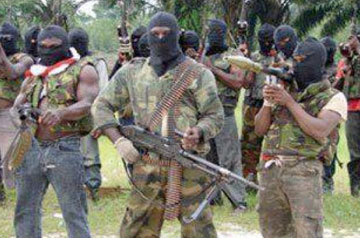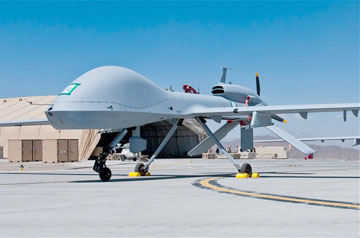|
Opinion:
Nigeria's decision, an eye-opener for the West
by K.M.H.C.B. Kulatunga
Nigeria's decision to seek Sri Lanka's expertise in counter terrorism
is an eye-opener to all, especially to those Western countries who
merely make a big noise on the need to crush terrorism without doing it
practically.
 |
|
Some members of the Boko
Haram terrorist group |
A high-level military delegation led by Chief of Defence Staff
General Jagath Jayasuriya, has held discussions with Nigerian
authorities on using Sri Lanka's first-hand experience, in combating the
Nigerian terrorist group - Boko Haram.
The Lankan delegation has advised the Nigerian authorities to adopt a
comprehensive security strategy to face threats posed by Boko Haram,
which had kidnapped more than 200 girls. They were snatched from their
school in Aprl by Boko Haram, a terrorist group linked to Al-Qaeda.
The girls have been tracked to three camps in the north of Nigeria,
near Lake Chad, 200 miles from where they were abducted.
Boko Haram is a terrorist organization based in northeastern Nigeria,
north Cameroon and Niger. Founded by Mohammed Yusuf in 2002, the
organization seeks to establish a so-called 'pure' Islamic state ruled
by Sharia Law, putting an end to what it deems Westernisation.
Highly questionable
A string of attacks carried out by Boko Haram in the recent past,
sent shockwaves across the world. "They suggested that the military
needed to enjoy the support of the entire country in its efforts to
counter terrorism," Nigeria's defence spokesman Chris Olukolade saw
quoted as saying after initial discussions with Sri Lanka defence
delegation.
Nigeria's Chief of Defence Staff, Air Chief Marshal Alex Badeh, had
said they were seriously considering the counter-insurgency experience
of Sri Lanka's Security Forces with a view to identifying those areas
that could be operationally beneficial to Nigeria in its battle to
defeat terrorism.
Ever since the 9/11 attack in 2001, most countries in the world with
superior military power have stressed the need to combat international
terrorism. But countries such as the US and the UK, which have been in
the forefront in the worldwide call to crush global terrorism, have done
precious little. While making an all-out effort to crush Al Qaeda which
has been a threat to the West, their actions in dealing with terror acts
in this part of the world are highly questionable.
The US even invades air space of other sovereign states to launch
drone attacks which have killed hundreds of innocent civilians in
Pakistan and Afghanistan. But they have hardly made sincere attempts to
crush terrorism in those countries.
Last weekend's bomb attacks in Karachi's Jinnah International Airport
reiterates the need to make a collective effort to crush global
terrorism.
 |
|
Attacks by US drones have
caused much suffering in Pakistan and Afghanistan. |
It is deplorable that certain Western countries change the definition
of terrorist to a freedom fighter when it comes to this part of the
world.
Terror acts
Though the US-led NATO forces had made many attacks in the guise of
crushing terrorism, they have hardly done anything to eradicate
terrorism from this part of the world. Instead, they pamper terror
groups by identifying them as freedom fighters, separatists or rebels.
But they same people who indulge in terror acts are called terrorists in
the West and are subjected to death.
Unfortunately, the West is still harping on the human rights of LTTE
terrorists killed in their battles against Sri Lanka's legitimate army.
Sri Lanka had every right to kill LTTE terrorists to protect its 21
million people and also to liberate nearly a million people forcibly
held as a human shield by Tiger terrorists.
Instead of hailing Sri Lanka's creditable and incomparable
achievement in crushing the most ruthless terrorist group in the world
and using the country's expertise in the global battle against terror,
countries such as the US and UK still intimidate Sri Lanka and exert
undue pressure through the United Nations Human Rights Council (UNHRC).
In this scenario, the steps taken by the Nigerian government to seek
Sri Lanka's expertise in the battlefield and counter terrorism is
commendable and opens eyes of the West. With heavy setbacks the US-led
NATO forces have suffered in Iraq and Afghanistan, these Western
countries must be feeling ashamed to turn to a smaller country (in
extent) to seek advice on counter terrorism.
Even if they are reluctant to seek Sri Lanka's advise in the global
battle against terrorism, they should at least desist from exerting
undue pressure on Sri Lanka under the guise of protecting human rights.
There is no doubt whatsoever that the Special Rapporteur (SR) on the
Human Rights of IDPs had exceeded his mandate. During the Interactive
Dialogue at the 26th UNHRC session in Geneva, Sri Lanka's Permanent
Representative Ravinatha Aryasinha questioned Dr. Chaloka Beyani's
mission to Sri Lanka.
Human rights
The mandate has been exceeded by several references and
recommendations incorporated in his Report on Sri Lanka including the
alleged violations of international humanitarian law and international
human rights, the Panel of Experts Report on Sri Lanka and allegations
of impunity of security forces.
The references and recommendations remain at the level of
unsubstantiated uncorroborated generalisations or allegations and have
exceeded his mandate as stipulated in Council Resolution 5/2.
The comments and recommendations on Dr. Beyani's report have also
compromised the impartiality and objectivity principles central to the
Code of Conduct of Special Procedures Mandate Holders. These references
have been retained in the SR's Report in spite of Sri Lanka Government's
request that they be deleted. This points out the need for special
procedures mandate holders to adhere to the Code of Conduct in the
execution of their respective mandates.
The West has conveniently ignored the huge efforts made by the
Government to develop infrastructure in the North and the East as well
as the de-mining operations carried out in those areas.
Terrorism
In contrast to the considerable challenges in the humanitarian crises
that continue to engulf many parts of the world today, Sri Lanka's
achievements particularly following the ending of the terrorism,
provides confidence and hope that even the most severe and
insurmountable humanitarian crisis can be overcome, with political
commitment. This has been rightly stressed by Ambassador Aryasinha
during the Interactive Dialogue with the Special Rapporteur on the Human
Rights of Internally Displaced Persons on Thursday.
The Government has taken the most appropriate step by letting
Parliament to decide whether the country should allow the controversial
investigation by the UNHRC under the highly questionable conduct of its
outgoing chief Navi Pillay.
Accordingly, dates have been fixed to hold a debate in Parliament on
the international investigation mandated by the UNHRC to probe alleged
human rights violations during the last phase of the battle against
terrorism. The main constituent party of the Government - the SLFP, has
taken this decision during its central committee meeting. The Government
has also decided not to respond to the request of the UNHRC to send
delegates to Sri Lanka to conduct the probe until the parliamentary
debate is over.
The SLFP Central Committee, after making a careful consideration of
the national importance of the matter, had decided to seek the views of
the Members of Parliament.
Final decision
No international force could challenge the power of the people. That
is precisely why the SLFP has decided to get a mandate from the people's
representatives - the MPs, in the Parliament. That will be the final
decision.
Those who now shed crocodile tears on the future of people in the
North and the East and national reconciliation were at a faster sleep
when Sri Lanka had been threatened by the LTTE terrorists who showed no
mercy to civilians as the country's 21 million people lived in mortal
feat, without knowing when the Tiger terrorists would explode their next
massive bomb.
None of those godfathers of humans rights or those sympathises with
people in the North ever uttered a word of comfort when the LTTE
terrorism was at its best. None of them had the courage to challenge the
LTTE when the Tigers were forcibly holding nearly one million people in
the North and the East as a human shield.
Now that the country's valiant Security Forces had crushed the LTTE
by sacrificing their life and limb, there are enough and more
self-appointed advisers to pontificate to us on reconciliation and human
rights. Why had they kept mum when the LTTE terrorists were
indiscriminately killing hapless civilians in all parts of the country?
The LTTE rump is now playing a different tune to woo sympathy of the
West. Moreover, certain Western politicians are depending heavily on the
Tamil Diaspora vote in their respective countries. Hence, they are
compelled to echo the voice of the LTTE rump which still daydream of a
separate state.
The true sons of our soil sacrificed their precious lives for the
sovereignty and territorial integrity of their motherland.
We should always protect their goals. We should never allow the LTTE
rump to democratically achieve what Velupillai Prabhakaran and his goons
have failed though an armed struggle.
This is exactly what the West has been planning under the guise of
human rights and reconciliation.
We do not need any third party or expert advice of the West in these
areas. Sri Lanka won its own battle against terrorism without the
support of those Western godfathers of human rights. Similarly, we could
find our own indigenous solutions to problems of the people living in
the North and the East.
We don't want any advice from the West on reconciliation as the
leaders of our country are capable enough to find solutions to our own
people. People in the West could not have a greater pain on people in
the North and the East than our own leaders. |

